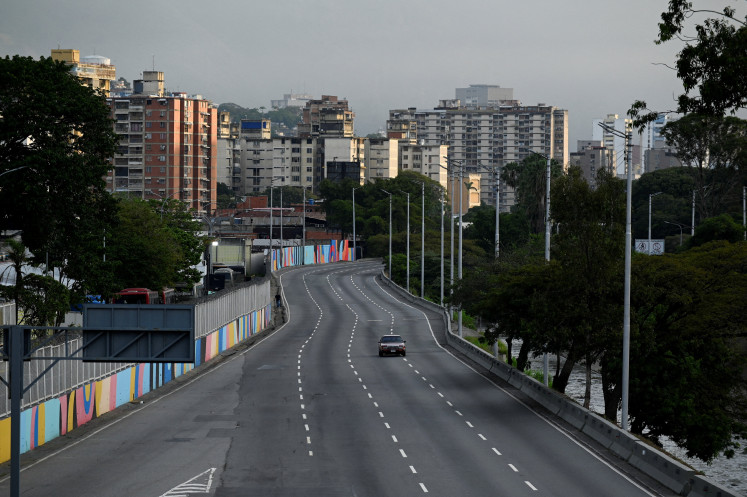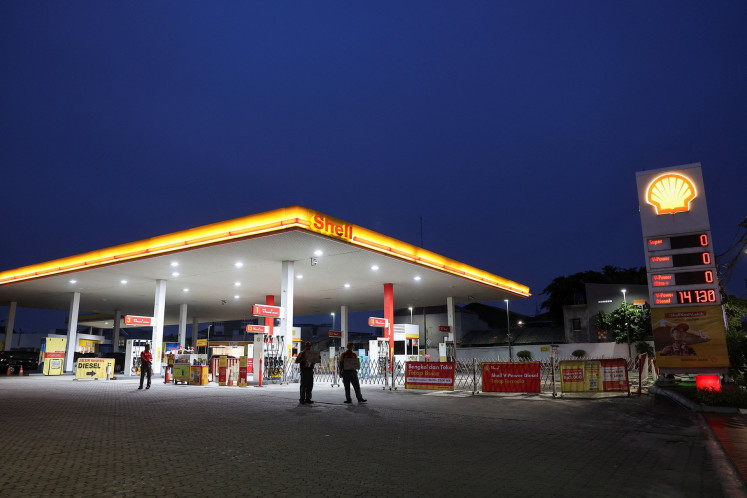Popular Reads
Top Results
Can't find what you're looking for?
View all search resultsPopular Reads
Top Results
Can't find what you're looking for?
View all search resultsOptions for presidential election 2009: Jusuf Kalla
Writing about Jusuf Kalla (JK) in the 2009 presidential election is an encore for me because I wrote an op-ed piece for the Financial Times on the 2004 presidential election
Change text size
Gift Premium Articles
to Anyone
Writing about Jusuf Kalla (JK) in the 2009 presidential election is an encore for me because I wrote an op-ed piece for the Financial Times on the 2004 presidential election. I remember my stance on Jusuf Kalla then was negative because there was popular belief that as a student activist, he was behind the burning of churches in Makassar in 1967. That is how he was branded as being anti-Christian.
Kalla inherited the family business that he developed after the demise of his father, Hadji Kalla; and as a businessman he inevitably had to compete with other businessmen, be they Chinese-Indonesian or foreign. It was then that he was branded anti-Chinese and anti-foreign.
However, my view of Kalla gradually changed to the positive because what he did in resolving Muslim-Christian conflicts in Maluku (Malino I Agreement) and Poso, Central Sulawesi (Malino II Agreement). He achieved this single-handedly, when he was coordinating minister for the people's welfare during Megawati Soekarnoputri's presidency. He was successful because he had the legitimacy of being an east Indonesian leader. That dispelled my basic distrust of him as being anti-Christian.
As Vice President, Kalla showed much-needed leadership and resoluteness in facing Islamic extremism in Indonesia. A case in point was his quick action following the death of key Jamaah Islamiyah activist Dr. Azhari, in Batu, East Java, in November 2005, and the seized propaganda materials and CDs that contained the JI's extreme ideology.
Kalla was taken aback by those materials, and took the initiative of calling leaders of Muslim organizations to a meeting at his residence, including very conservative ones, to show them the materials. He demanded of them whether that was the kind of ideology they wanted to see adopted in Indonesia.
If not, he challenged them to find ways to win over such ideology. The leaders present made a pledge to counter the extremism in their own ways and to cooperate to prevent the subversion of Islam in Indonesia.
As a leader, Kalla has the commitment and authority to exert his influence over Muslim leaders to fight extremist activities.
His main achievement was undoubtedly the Aceh peace agreement, which put to an end 23 years of civil war and insurgency. On his own initiative, he began approaching the leaders of the Free Aceh Movement (GAM) in October 2004, before his move to the vice president's office. The suffering and destruction wreaked by the tsunami in 2006 led Kalla to use it as an impetus to move on with his efforts to seek the final resolution of the Aceh conflict.
In addition, he made a lot of efforts to help and support the Papuan quest for special autonomy, although the situation in the province was more complicated, due partly to the tribalism that prevails there.
Overall, Kalla has done a lot to support the Susilo Bambang Yudhoyono government, especially in the economic field, as agreed by Yudhoyono and Kalla at the outset of the then new government. He is pragmatic in his economic outlook, and as such he has been open enough in his view on globalization, albeit still harboring previous biases and notions as a businessman that Indonesia has to build its national economy.
In facing the current economic crisis, government intervention is necessary and should increase. Examples of failures of socialism are still fresh in our mind, and globalization is the main trend in the international economy.
The national interest is important, but international relations in a global community are a necessity. Kalla should be able to balance the two aspects of the economy.
Another plus is his quick mind and willingness to answer any question. He sometimes "blinks" and does not think deeply. Some of his answers are gut reactions, especially on issues he does not know very well. He tends to speak very fast and sometimes unclearly, which often causes some misunderstanding. The positive side of Kalla is that he is open and egalitarian in entertaining questions.
While his English is adequate for addressing a small group, for dealing with a wider audience, however, he would be better off reading out a prepared text or using a good interpreter.
On the anti-Chinese stigmatization that Kalla bears, I believe it is unfounded, as I got to him better through my many discussions with him on various issues. He may sound nationalistic, but he is also open to compromise and is willing to discuss all issues further.
Criticism over his and his family's businesses abounds. Kalla should take them in stride because he really understands the problems. While doing business is everybody's right, however, once one is voted into public office one should stop and make sure there is no whiff or smell of conflict of interest between the family and the state.
People's trust in clean government is absolutely necessary, without which office holders may not be able to run the government. It is a sacrifice, but a necessary one for the good of the people and for the success of the governance.
The writer is vice chairman for the CSIS Foundation's board of trustees.










